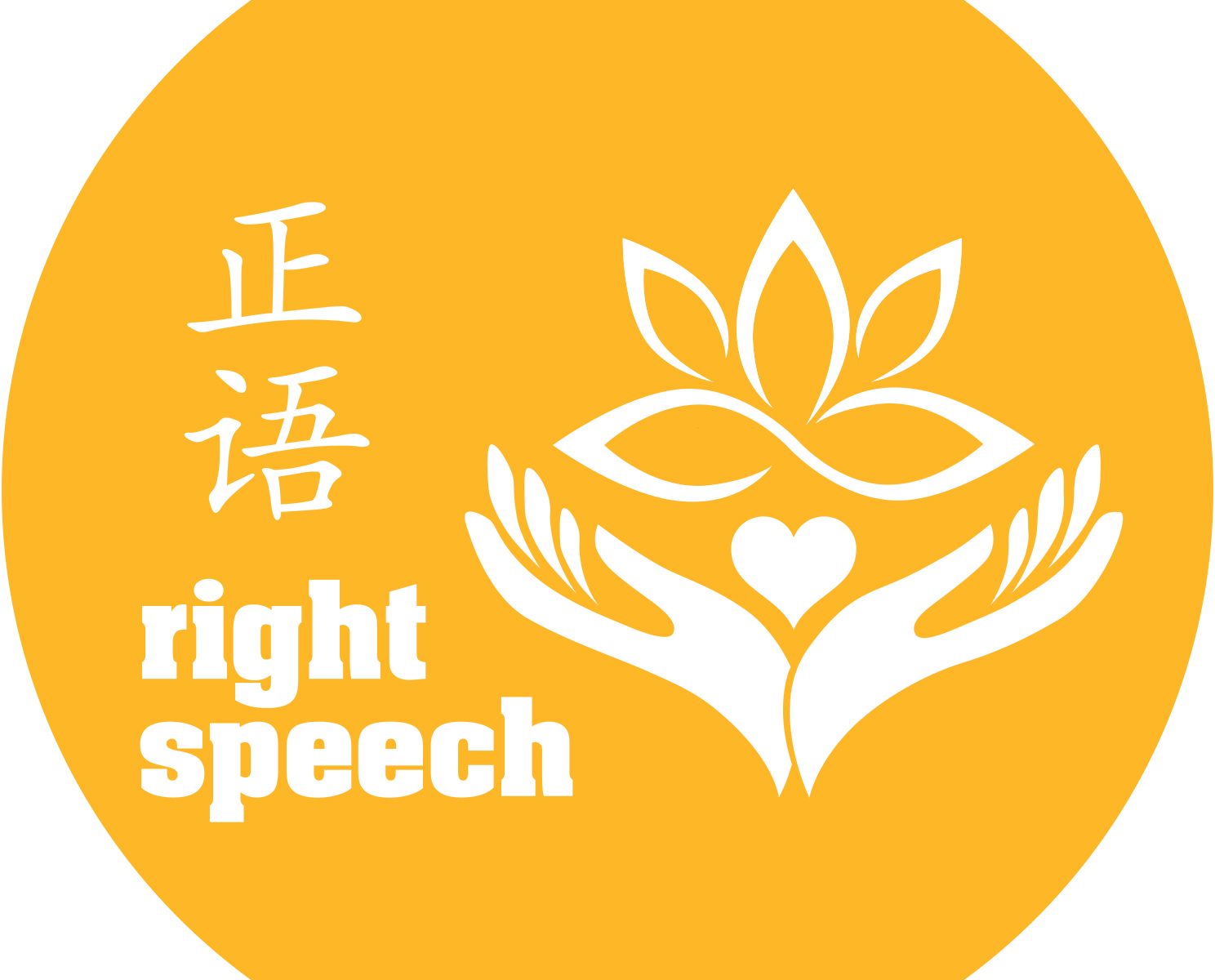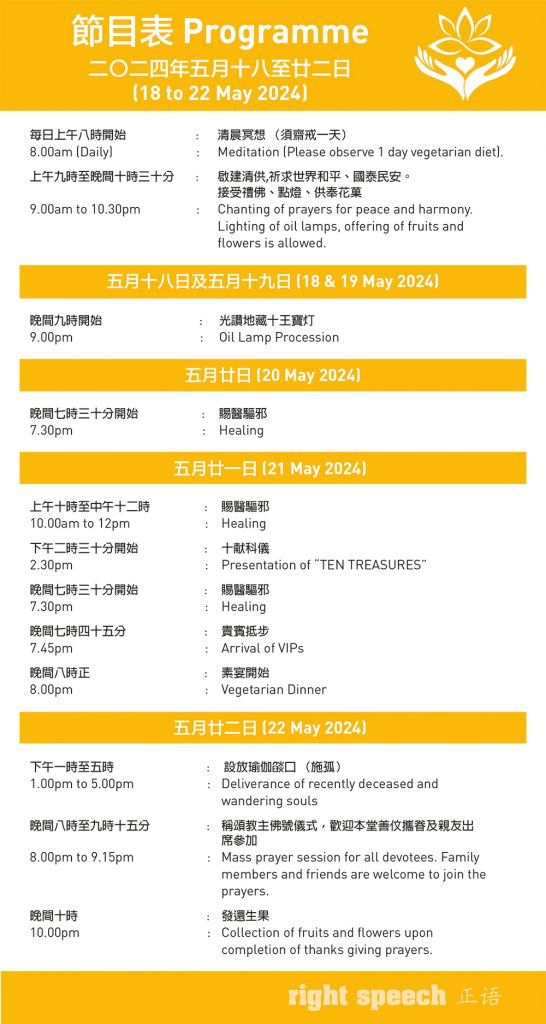
The Four Virtues of Right Speech
On these four virtues of 1) not telling lies, 2) no divisive speech, 3) no abusive speech and 4) no idle chatter, we asked our Master for further clarification. She replied with two examples.
Example 1: Do not tell tales/lies
A mother is suffering from a terminal illness. Her daughter is with her when the doctor shares the news. However, not wanting to put emotional burden on the dad and rest of the family, the mother and daughter decide not to disclose the diagnosis from the doctor. How would you advise them?
Our Master explains:
First, let us delve into the reasons behind the reluctance of the mother and daughter to share the doctor’s diagnosis with the dad and the rest of the family. What fears or concerns underlie their decision? Is it a question of the dad’s emotional resilience, or perhaps the potential upheaval within the family dynamic? Understanding these nuances is crucial before proceeding.
Indeed, we must discern whether the dad is emotionally and physically equipped to handle such news. Is he in a stable state to process and cope with the gravity of the situation? Similarly, what are the potential ramifications within the family if the diagnosis is revealed? Are there risks of discord or distress that could arise?
In recognizing these circumstances, we acknowledge the unfolding of karma, bringing the family together in this moment of joy and sorrow. Life is a tapestry of joy and pain, with impermanence weaving through every thread. Accepting this impermanence is paramount to our spiritual growth.
Right speech transcends mere truth-telling; it encompasses the considerations of utility and emotional impact, as well as the timing of our words. Even a truthful statement must be weighed against these factors before being spoken.
In truth, the mother is grappling with a terminal illness—a fact with both utility and emotional weight. Sharing this reality can foster understanding and empathy within the family, allowing them to support her through her journey. However, disclosing such news prematurely or to those unprepared may exacerbate the situation.
The emotional resonance of this truth reverberates not only within the immediate family but also among her extended relatives and friends. It reshapes their perceptions and expectations of her future, invoking feelings of sorrow and adjustment.
With this understanding, we must discern the appropriateness of sharing this information with each individual and gauge the right moment for doing so. For the dad, if his health or emotional well-being is fragile, withholding the news temporarily may be prudent, waiting for a more opportune time. As for the children and siblings, the decision to disclose depends on the potential benefits to them and their readiness to receive such news.
In essence, the principle of right speech guides us to speak truthfully, yet with discernment and compassion, considering the welfare and readiness of both speaker and listener.
Example 2: Do not gossip
Someone within our Shrine community has been diagnosed with cancer and, as often happens, the news ripples through our circle. Concerned volunteers begin exchanging information—details about the individual, their circumstances, and the challenges faced by their family, including the husband’s struggles with heart problems and depression.
In their compassion, some members feel compelled to gather and visit the afflicted individual, to offer comfort and support. They approach our Master seeking guidance on their intentions.
In response, our Master offers this wisdom:
Upon hearing news, whether it be factual or mere hearsay, we are tasked with a responsibility before we utter a single word. If the information comes directly from the individual involved, our first step must be to seek their explicit consent before sharing it further. Respecting their autonomy and privacy is paramount, regardless of the nature of the information.
However, if the news is merely hearsay, we must refrain from entertaining it altogether. It is not our place to perpetuate unverified information. Instead, we should gently remind the bearer of such news about the importance of verification and consent before spreading potentially sensitive information. By doing so, we prevent the propagation of gossip that could have unintended and negative consequences.
In this particular case, the well-intentioned visitation plans of our Shrine members could inadvertently burden the afflicted family further. Our actions, though driven by compassion, must be tempered by prudence and mindfulness of the potential impacts on those we seek to support.
正语四美德
1)不说谎,2)不挑拨离间,3)不用恶言相向,4)不无事生非
关于这四项美德,我们向师父请教如何在日常生活中实现。她透过两个实际案例为我们解释
案例一:不编造/散播虚假言论
一位年迈的母亲患有绝症,当医生告知此消息时,女儿刚好在场陪伴着母亲。但是,为了不给爸爸和家里其他人带来情感负担,母亲和女儿决定隐瞒这个事实。请问您会给他们什么建议?
师父解释:
首先,让我们深入了解母亲和女儿不愿与父亲及家庭其他成员分享医生的诊断背后的原因。是什么恐惧或担忧驱使了他们的想要隐瞒消息的意愿?
选择隐瞒是建设在父亲情绪承担能力吗?或是担心告知家人朋友后可能会造成关系及情绪上的浮动?在选择告知他人之前,事先了解并探讨,其微妙和细微的影响力,至关重要。
我们得先能够实现判断父亲是否拥有承担【被告知】的能量。生理及心理都有能力,承担如此沉重的消息。父亲的身心灵状态是否稳定?同样的,在选择告知,或不告知亲友母亲的诊断结,将可能为亲友们带来那些影响?选择告知,或选择隐瞒,是否存在一些潜在风险,或为大家带来某种的情绪负担?
在探讨这些状况的同时,我们也必须虚心的接受因果业力的牵引,所有生命的相聚离散,欢乐痛苦,健康病痛,生老病死,都属于生命旅途的过程。所有的结束,都有开始,所有的开始也必定有结尾。人有悲欢离合,月有阴晴圆缺,在混乱的情绪中,我们更需要,并且虚心接受生命是欢乐与痛苦的织锦,而无常贯穿其间。
虚心接受生命无常,也将幻化为身心灵成长的一个重要的环节。
正确的言语也将因此超越;单纯,且非黑即白,的陈述事实。正语涵盖及考虑到的是,消息真伪,资讯传达,并且其言语的情绪能量,传达方式,接受信息者的情感承受能量,以及言语传达的时机,等等。
所有信息的传达,即便是事实的陈述,我们也都需要在言语前,权衡各种因素。
实际上正在发生信息是 ‘母亲正面临绝症’。
这项消息,是附带着情绪能量,且重要的信息。选择告知,或隐瞒,两者都有其利与弊,选择告知后可能为亲友们发掘同理心,更加理解真实的状况,让大家为她的生命旅程中带来支持。然而,向过早或尚未准备好的人告知,也将可能为大家带来不必要的情绪负担。
这样的消息,是个附带着强大情绪渲染的信息。告知及被告知的亲属们以及母亲与亲友们的关系,都将因此而有所改变。这样的真相不仅对她的先生和孩子,同时也对她的兄弟姐妹和周围的人,都带来一定程度上的情绪渲染。
有了以上的理解及深思,我们才能更好的判断及选择,告知,或不告知的适当性,并评估适合的告知时机,告知及传达信息的方式。
对于父亲,假设他的健康或情感能量不稳定,我们更需要谨慎的思考其告知及隐瞒的适当性,谨慎衡量其告知(或隐瞒)的时机。至于孩子及亲友们,我们也如同必须权衡及深思告知后,带来的利与弊,以及亲友们,身心灵的承受能力是否足够,且准备好接受这样的消息。
本质上,正语原则上指导我们真诚地说话,但同时,我们也需要培养一定的辨识能力,同理心,并且深思,告知者及被告知者的各种微妙因素,权衡其微妙的利弊得失,及对大家带来的好坏影响。
案例二:不散播八卦,不无事生非
我们听说XYZ太太得了癌症。佛堂的志愿者开始窃窃私语。
“谁、发生了什么事、多么伤心及可怜 、她的先生患有心脏病和忧郁症。”
出自于善意,大家想要前去一起探望她。志愿者纷纷向师父寻求建议。
师父解释:
当我们接到这项消息时,无论这是已经确认过真实发生的事情,或是还没确认的传闻及八卦。我们在言语前都必须承担言语后将带来的潜在责任。
假如如果这个消息是由当事人直接告知的事实,我们必须事先取得他们的同意才能分享。我们也将在第一时间,尊重当事人的意愿,并且在言语前,得到当事人的同意。我们必须尊重当事人的“自主权”以及“隐私权”。
假如这个消息仅仅是传闻及八卦,我们则不不应该在无法确认资讯正当性前进行散播。我们甚至不应该理会。反之,我们更应该温柔的劝导及提醒,谣言止于智者。
这里,我们能够理解到,虽然言语的行为建立在善意及同情心的基础上,我们也必须谨慎及深思,言语后可能带来的种种影响。拜访的好意有可能会不经意的带给他人不必要的困扰。


